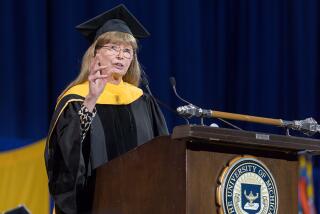Top computer award breaks gender barrier after 40 years
Retired IBM Corp. computer scientist Frances E. Allen, whose work helped crack Cold War-era code and predict the weather, today will be named the first woman to receive her profession’s highest honor.
The Assn. for Computing Machinery has granted the A.M. Turing Award for technical merit to no more than a few people each year since 1966. Winners include Vinton Cerf and Robert Kahn, who helped create the underpinnings of the Internet; Marvin Minsky, an artificial intelligence guru; and Douglas Engelbart, inventor of the modern computer mouse.
When Allen receives the award, which comes with a $100,000 prize, at the association’s annual banquet in San Diego on June 9, it won’t take a computer scientist to wonder: What took so long?
Allen’s achievement comes long after women toppled barriers in other professions. Marie Curie became the first woman to win the Nobel Prize in 1903. Edith Wharton won the Pulitzer Prize for fiction in 1921. Sandra Day O’Connor joined the U.S. Supreme Court in 1981, two years before Sally Ride became the first American woman in space.
But computer science still is dominated by men. Fewer than one in five bachelor’s degrees in computer science were given to women in 1994, according to the Computing Research Assn. Ten years later, that figure remains about the same, at 17%.
Allen, 74, spent her entire career at IBM, winning several of the company’s top awards. One of them, won in 1968 for her research, came with a prize: a pair of cufflinks and a tie clip.
“No woman had ever won that award before,” Allen said Tuesday, chuckling, from her home in Croton-on-Hudson, N.Y.
Two decades later, when she was named the first female IBM Fellow, her award certificate recognized the recipient for “his accomplishments.”
“These anecdotes are funny, but they do represent having to break through a lot of walls that still exist today,” Allen said. “I believe we’re moving into a whole new era for women in our field.”
The perception that computing is populated by lonely nerds in cubicles has hampered efforts to attract more women to the field, said John White, chief executive of the New York-based Assn. for Computing Machinery.
“There’s an image about our profession that doesn’t appeal to women, which is a shame because women in our field are just fabulous,” White said. “They’re great researchers. They’re great leaders. There just aren’t enough of them. This has been an issue for many years.”
When Allen started her career as a researcher at IBM in 1957, she had few female colleagues. From 1963 to 1968, she was the only woman in a team of more than 40 scientists at IBM working on an advanced computing project that, among other things, helped meteorologists analyze large batches of data to predict weather. On another project, she worked with the U.S. National Security Agency to help build a computer that could break Cold War era code.
“We’ve always had lots of powerful machines,” said Jeanne Ferrante, associate dean of engineering at the University of California at San Diego who worked at IBM from 1978 to 1994. “But making them useful to people is really what Fran did.”
Although she retired from IBM in 2002, Allen’s work in making programs run faster on parallel computers remains relevant. Many of today’s personal computers come equipped with multiple processors.






